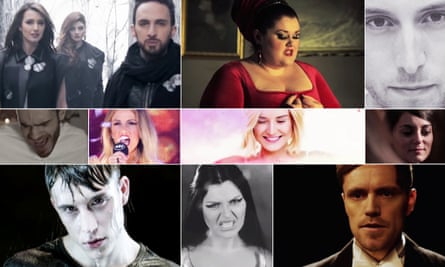It is time once again for Eurovision, the annual kitschy Europop extravaganza, taking place this year in Vienna, Austria.
Here’s what’s probably going to happen :
- Viewers will be treated to a few out of the ordinary performances
- Everyone will be complaining about regional voting blocs
- Like most competitions that involve competing against other European nations (and doesn’t include the use of bicycles), the UK entry will flop.
But we’re going to be a bit bolder than that.
We’re having a shot at predicting who is going to follow in the footsteps of Conchita Wurst as the winner of the contest.
Our model is not based on the quality of the songs (or the lack thereof), but on an average of votes each participating nation received over the past 12 years, which is then adjusted for factors that include present day geopolitics, form in more recent editions, past performance and tempo.
Sceptical about this approach? In 2011, the winners, Azerbaijan, were in our top-three, and then in 2013 we backed Azerbaijan, who came second. We have now spent the last two years tinkering with the model and hope the improvements we’re introducing mean that our projected winner will be the one to take it all.
So without further ado, the Guardian data prediction for Eurovision 2015 winner is...
Armenia!
Genealogy’s controversial “Face the Shadow” references the mass murder of 1.5m Armenians by the Ottoman Empire in 1915. It was originally called “Don’t Deny” – Turkey still contests that it was not a genocide, and this title was deemed too political by Eurovision organisers.
Other countries our model expects will make the top 10 include Serbia, Sweden, and Azerbaijan.
The predicted top 10

What about the losers?
Our model suggests that France may be on course to receive nul (zero) points with Lisa Angell’s N’oubliez Pas.
Bear in mind that a country getting zero points has not happened in the final since UK pair Jemini’s off-key performance of Cry Baby in 2003.
Despite that historic low point, we think the UK may defy (low) expectations and not finish last, or thereabout. The reunion of boyband Blue and an appearance by Andrew Lloyd Webber have helped drag up Britain’s median score (contrary to what the popular press might say).
Nevertheless, our model does still expect the UK to join France in the lower end of the table along with Lithuania, Germany, Cyprus, Estonia and Slovenia.
The predicted bottom 10

One participant our model cannot account for is this year’s dark horse: Australia
For the simple reason that Australia is not in Europe (despite some wanting to import its immigration points system).
Our neighbours from the other side of the world are entering for the first time to celebrate the 60th year of the song contest, and as a result there is no historical data for how Australia performs in European song contests.
It is unclear whether their tune, by Guy Sebastian, will be embraced, rejected or if people will get confused and think he is the Austrian entrant.
WARNING: please do not hold us responsible for any bets you may place as a result of this statistical exercise. It’s all a bit of fun.
Are there voting blocs?
Yes. And they have pretty much always worked how you think they would:
Scandinavia groups together (a habit it also has in football tournaments) - for example since 1998, Sweden has got an average of 10 points from Denmark. Other close relationships include Slavic countries, Greece and Cyprus, Ireland and the UK, as well as a bloc comprising several – but not all – former Soviet nations (or what some may refer to as Russia’s customs union).
The last 14 Eurovision winners have all been from different nations and our prediction of Armenia would continue that trend.
There may be a reason for this happening. In the Channel 4 TV show Father Ted, two inept priests are chosen to represent Ireland at a Eurovision-style competition because the country cannot afford to host another contest.
A similar joke was made about the austerity-hit nations of Europe following the financial crisis and, indeed, Portugal was one of a few countries that dropped out of 2013’s event. You try justifying spending millions of Euros on glitter to the European Central Bank. Which leaves us with one final question: what are the odds on next year’s finals being held in Frankfurt?
Correction: an earlier version of this article said Serbia came third in 2011. They came third in 2012.

Comments (…)
Sign in or create your Guardian account to join the discussion